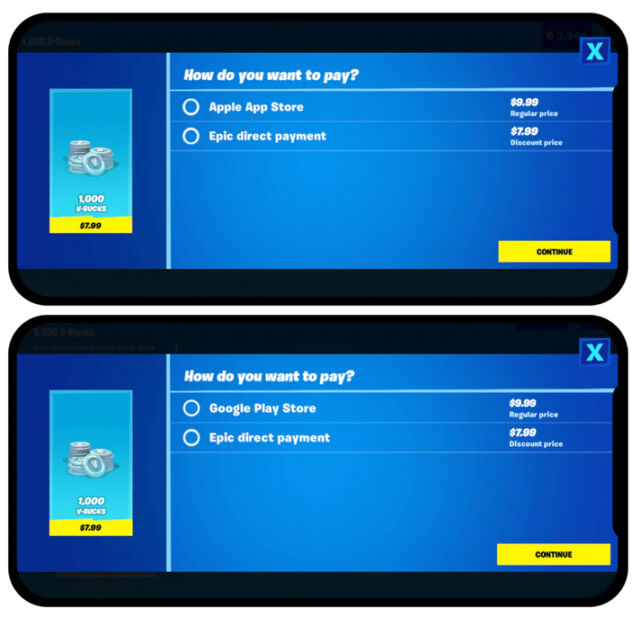
Two years ago, Epic Games went to court to challenge what it called Apple’s monopolistic control of the iOS app marketplace. Now, as that trial crawls through the appeals process, Epic’s legal focus is moving to the other major mobile platform holder: Google.
The Epic v. Google trial, which starts today in a US district court in San Francisco, won’t be a precise rehashing of the issues laid out in that Apple trial. But while legal history won’t precisely repeat itself in the coming days and weeks, it will very likely rhyme.
Just when I thought I was out…
Both of Epic Games’ antitrust cases date back to August 2020, when Epic flaunted iOS and Google Play App Store rules by hotfixing an “Epic Direct Payment” option into Fortnite‘s mobile in-game V-Bucks store. While Apple was the first to respond by removing the game from iOS that afternoon, Google followed suit just a few hours later by taking the game down from the Google Play Store. Epic was ready with lawsuits to instantly respond to both moves.
At the time, Google was quick to point out that the ability to sideload apps on Android meant Epic hadn’t been completely barred from distributing Fortnite on the platform (as it had been on iOS). “The open Android ecosystem lets developers distribute apps through multiple app stores,” Google said in 2020. “While Fortnite remains available on Android, we can no longer make it available on Play because it violates our policies. However, we welcome the opportunity to continue our discussions with Epic and bring Fortnite back to Google Play.”

Epic was well aware of this difference, too. Back in 2018, the company pulled Fortnite from the Google Play store voluntarily as a way to avoid what it called Google’s “disproportionate” 30 percent “store tax.” But while Epic attracted tens of millions of Android Fortnite downloads without Google Play, the publisher was soon publicly complaining of technical issues and malware sites masquerading as “official” Fortnite download sources.
By April 2020, Epic had returned to the Google Play store, accusing Google of imposing a number of important limits on its sideloaded software. As the company said at the time:
Google puts software downloadable outside of Google Play at a disadvantage, through technical and business measures such as scary, repetitive security pop-ups for downloaded and updated software, restrictive manufacturer and carrier agreements and dealings, Google public relations characterizing third-party software sources as malware, and new efforts such as Google Play Protect to outright block software obtained outside the Google Play store.
Is Google Play a monopoly?
Epic’s legal complaint against Google focuses on many of the same issues brought up in the above statement. While Android doesn’t completely disallow competing app stores as Apple does on iOS, Epic argues that Google still puts up “myriad contractual and technical barriers” to “eliminate competition” for the Google Play store.
For instance, Epic argues that Google discourages sideloading by forcing users to go through “a dozen steps, requiring the user to change default settings and bravely click through multiple dire warnings” to circumvent the Play Store. Even after going through these steps, sideloaded apps can’t make use of system functions like automatic background updating, Epic says.
Google also signs deals with Android OEMs that force them to pre-install the Play Store. Meanwhile, Epic says those deals often include exclusivity clauses that outright prevent the pre-installation of competing third-party app stores or offer “significant financial incentives” to discourage that kind of pre-installed competition.
https://arstechnica.com/?p=1981581

